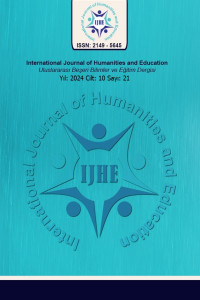Abstract
Sosyoloji, toplumları, sosyal ilişkileri, kurumları ve sosyal olayları inceleyen bir bilim dalıdır. Sosyologlar, toplumda meydana gelen değişimleri, yapıları, eğilimleri ve etkileşimleri anlamak için çeşitli araştırmalar yaparlar. Sosyologlar, toplumun yapılarını ve bu yapıların zaman içinde nasıl değiştiğini inceleyerek, toplumdaki sınıf, cinsiyet, etnik gruplar gibi unsurları anlamaya çalışırlar. Eğitim, aile, ekonomi, siyaset gibi kurumları ve bu kurumlar arasındaki ilişkileri araştırarak, toplumsal düzeni ve etkileşimleri anlamaya çalışırlar. Sosyologlar, bireylerin ve grupların davranışlarını inceleyerek, toplumun kültürel yapısını anlamaya çalışırlar. Dil, normlar, değerler gibi kültürel unsurlar üzerinde de araştırmalar yapabilirler. Sosyologlar, toplumun karşılaştığı sorunları, adaletsizlikleri ve eşitsizlikleri araştırarak, bu sorunlara çözüm önerileri geliştirmeye çalışırlar. Örneğin, yoksulluk, suç, eğitim eşitsizliği gibi konular sosyolojik araştırmaların odak noktalarından biri olabilir. Sosyologlar, toplumun işleyişi ve değişimi hakkında çeşitli teoriler geliştirirler. Bu teoriler, sosyal olayları anlamak ve açıklamak için kullanılır. Sosyoloji araştırmaları genellikle nitel ve nicel araştırma yöntemleri kullanarak yapılır. Nitel araştırma, derinlemesine analiz ve açıklamalara odaklanırken, nicel araştırma geniş örneklem ve istatistiksel analizleri içerir. Bu alan içerisinde birçok alt alan bulunmaktadır ve sosyologlar geniş bir konu yelpazesinde çalışabilirler. Sosyoloji araştırmaları, toplumun karmaşıklığını ve çeşitliliğini anlamak ve bu anlayışı kullanarak toplumun sorunlarına çözümler üretmek amacı taşır. Sosyoloji ile ilgilenen profesyonellerin ve akademisyenlerin bir araya geldiği dernekler, bu alanda bilgi paylaşımını teşvik eder, araştırmaları destekler ve sosyologlar arasında iletişimi güçlendirir. Bu makalede dünyadaki bazı sosyoloji dernekleri yorumlayıcı yaklaşım çerçevesinde incelenip tartışılacaktır.
Keywords
Sosyoloji Sosyoloji tarihi Sosyoloji dernekleri Sosyoloji toplulukları Sosyolojinin ilgi alanları
Ethical Statement
Araştırma makalesi olduğu için etik beyan gerekmemektedir.
Supporting Institution
-
Project Number
-
Thanks
-
References
- Sosyoloji Derneği. (2023). “Dernek hakkında”. https://sosyolojidernegi.org.tr/kategori/dernek-hakkinda adresinden 01.12.2023 tarihinde erişilmiştir. Wallace, Ruth A. and Alison Wolf. (1995). Contemporary Sociological Theory: Continuing the Classical Tradition (4th ed.). Prentice-Hall. White, Harrison C. (2008). Identity and Control. How Social Formations Emerge (2nd ed.). Princeton: Princeton University Press. Willis, Evan. (1996). The Sociological Quest: An introduction to the study of social life. New Brunswick, NJ: Rutgers University Press.
Abstract
Sociology is a branch of science that studies societies, social relations, institutions and social events. Sociologists conduct various research to understand the changes, structures, trends and interactions occurring in society. Sociologists try to understand elements such as class, gender, and ethnic groups in society by examining the structures of society and how these structures change over time. They try to understand the social order and interactions by investigating institutions such as education, family, economy, politics and the relationships between these institutions. Sociologists try to understand the cultural structure of society by examining the behavior of individuals and groups. They can also conduct research on cultural elements such as language, norms, and values. Sociologists investigate the problems, injustices and inequalities faced by society and try to develop solutions to these problems. For example, issues such as poverty, crime, and educational inequality can be one of the focal points of sociological research. Sociologists develop various theories about the functioning and change of society. These theories are used to understand and explain social phenomena. Sociology research is generally conducted using qualitative and quantitative research methods. Qualitative research focuses on in-depth analysis and explanations, while quantitative research involves large samples and statistical analysis. There are many subfields within this field, and sociologists can work on a wide range of topics. Sociology research aims to understand the complexity and diversity of society and to produce solutions to society's problems using this understanding. Associations that bring together professionals and academics interested in sociology encourage knowledge sharing in this field, support research and strengthen communication among sociologists. In this article, some sociology associations in the world will be examined and discussed within the framework of an interpretive approach.
Keywords
Sociology History of Sociology Sociology associations Sociology communities Interest areas of Sociology
Project Number
-
References
- Sosyoloji Derneği. (2023). “Dernek hakkında”. https://sosyolojidernegi.org.tr/kategori/dernek-hakkinda adresinden 01.12.2023 tarihinde erişilmiştir. Wallace, Ruth A. and Alison Wolf. (1995). Contemporary Sociological Theory: Continuing the Classical Tradition (4th ed.). Prentice-Hall. White, Harrison C. (2008). Identity and Control. How Social Formations Emerge (2nd ed.). Princeton: Princeton University Press. Willis, Evan. (1996). The Sociological Quest: An introduction to the study of social life. New Brunswick, NJ: Rutgers University Press.
Details
| Primary Language | Turkish |
|---|---|
| Subjects | Print Culture, Organisational, Interpersonal and Intercultural Communication |
| Journal Section | Research Article |
| Authors | |
| Project Number | - |
| Publication Date | April 30, 2024 |
| Submission Date | December 7, 2023 |
| Acceptance Date | March 23, 2024 |
| Published in Issue | Year 2024 Volume: 10 Issue: 21 |
International Journal of Humanities and Education (IJHE)
This work is licensed under a Creative Commons Attribution-NonCommercial-No Derivatives 4.0 (CC BY-NC-ND 4.0) International License.


